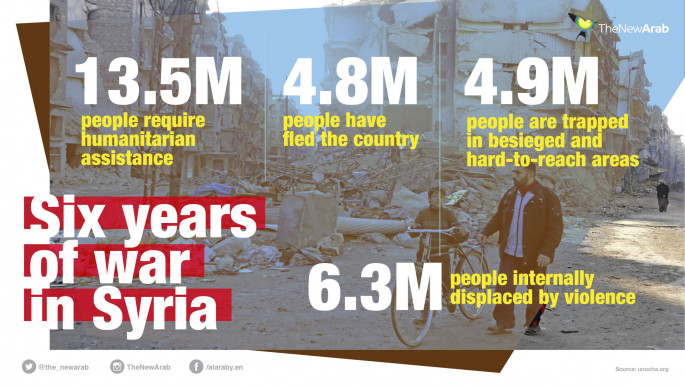Syria’s war has 'cost the economy $226 billion'
The brutal conflict has killed more than 400,000 people and displaced half the country's population since it began in March 2011.
The scale of the destruction runs much deeper than death tolls or damage to infrastructure alone can capture, according to a new World Bank report published on Tuesday.
"The war in Syria is tearing apart the social and economic fabric of the country," World Bank Vice President for the Middle East and North Africa Hafez Ghanem said.
An average of 538,000 jobs had been lost annually between 2010 and 2015, with more than three in four Syrians of working age – around nine million people – neither employed nor enrolled in school or training programmes.
"The long-term consequences of this inactivity will be a collective loss of human capital leading to a shortage of skills in Syria," the World Bank said.
 |
More than three in four Syrians of working age – around nine million people – are neither employed nor enrolled in school or training programmes |  |
The conflict has damaged or destroyed 27 percent of Syria's housing stock and around half the country's medical and educational facilities.
 |
|
Cumulative Gross Domestic Product losses since Syria's conflict erupted are estimated at $226 billion, about four times the Syrian GDP in 2010, according to the World Bank.
Breakdown of society
"The number of casualties is devastating, but the war is also destroying the institutions and systems that societies need to function, and repairing them will be a greater challenge than rebuilding infrastructure – a challenge that will only grow as the war continues," Ghanem said.
The damage to the health sector in particular has had devastating consequences, with more people estimated to have died from deficiencies in the medical system rather than directly from fighting.
"The breakdown of the systems that organise both the economy and society, along with the trust that binds people together, has had a greater economic impact than the destruction of physical infrastructure," the World Bank said.
The calculations by the World Bank were based on cross-checked satellite imagery of certain cities and areas and extrapolated based on a conflict intensity model.
If the conflict was to end this year, GDP could regain 41 percent of its pre-conflict level within four years, the report added.
 |
If the conflict was to end this year, GDP could regain 41% of its pre-conflict level within four years |  |
That figure shrinks however for each year the conflict continues, the body found.
The World Bank warned that the number of Syrians fleeing the country would double between the sixth and twentieth year of the conflict.
Syria's conflict evolved from a bloody crackdown on protests in 2011 to a devastating war that has drawn in world powers, including Russia and a US-led international coalition.
The brutal tactics pursued mainly by the Syrian regime, which have included the use of chemical weapons, sieges, mass executions and torture against civilians have led to war crimes investigations.
Agencies contributed to this report



